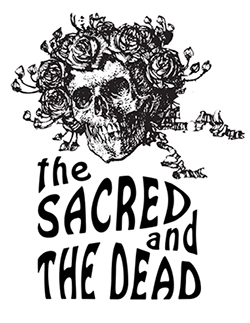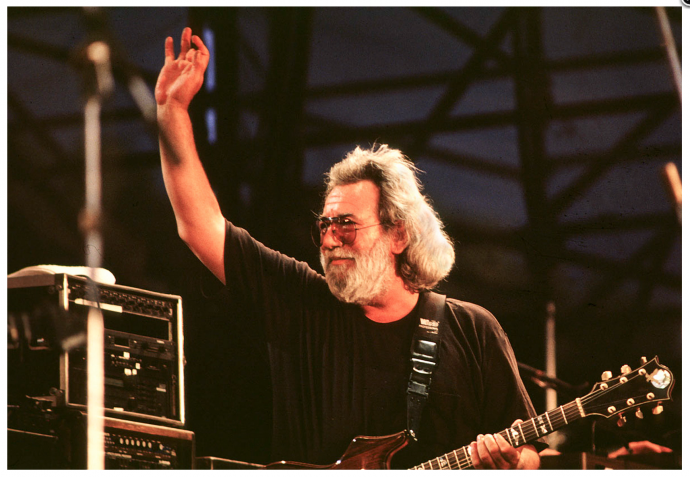well
I love you more than words can tell
Listen to the river sing sweet songs
To rock my soul.”
~ From “Brokedown Palace”
For many of us who followed the Dead in our younger years, “Brokedown Palace” signaled the end of a show. It was a classic way to send us off wandering down the next road. But I think that as we traverse the “many, many worlds” that have come and gone in the 20 years since their last show in Chicago and Jerry leaving us soon after, the reality goes deeper. Words fail us when we try to describe how much the band meant (and means) to us and how much we love each other.
Real rock ‘n’ roll is rooted in getting to the real thing. At its best, it’s about deconstructing previous generations, pretensions, and cutting to the bone of experience.
The Dead were real. The idea of buying an album (although we’ve all done it) was antithetical to what they were about—live shows, imperfect, grungy (before “grunge” was a thing). Plumbing the depths of each moment was why people became Deadheads.
The first show I went to in 1988 was at the Rosemont Horizon just outside Chicago with my Wheaton College roommate, Mark Metherell, and our buddy Dave Panjwani. I was just getting into the Dead, adding them to my Walkman mix of reggae and punk tapes. Getting ready for the show, I put on a do-rag and tie-dye t-shirt… Metherell and Panj just laughed at me—they basically told me that you don’t “dress up” for Dead shows.
You go as you are.

A special series on religion and culture produced in collaboration with the Office of Religious Life at the University of Southern California
Wheaton is a school that had (and still has) a long list of ways you were supposed to believe, behave, and become. It was constructs of truths built upon so many constructs of truths that real truth didn’t matter anymore. Wheaton continues to be a place where intellectual dishonesty is favored over difficult truths.
Fundamentalist and conservative evangelical models of belief have more constants than pre-Galilean star charts and eventually I got kicked out for writing the wrong poetry. Twenty-odd years later, professors still get fired for speaking the truth, and if you lift the rugs you will find skeletons.
Then as now, honesty and authenticity aren’t core values of evangelical Christian culture, but they were absolutely essential if you were going to follow the Dead.
My roommate Mark was one of the most authentic people I’ve ever met. Wholly original. He taught me hard lessons many times over the years—teaching without teaching. He showed me how to be who I am. In a world of manipulated experiences, Mark helped me get comfortable living in my own skin.
Be yourself.
David Dodd, in his own essay about “Brokedown Palace,” quotes Ken Kesey talking about how transcendent an experience can be when hearts are freed to move past pretense:
“I lost my son in a wrestling accident. On the way to a wrestling meet, the van went off a cliff. I remember the feeling…I’ll get back to that…, ok I’ll tell it…You know, if anybody knows the song ‘Brokedown Palace,’ (fare thee well, fare thee well, I love you more than words can tell), after Jed had been dead a few months we went to see the Dead. They were playing at our opera house. They did their usual stuff and got their big ovations and then, they started playing ‘Brokedown Palace’ and they all turned toward me and all our family was sitting up there. They all turned toward us and the guys in the audience began to turn toward us. And that song was sent from the Grateful Dead to our bruised hearts. And it was like having somebody reach out and putting their hand on your shoulder and saying, ‘Yeah we feel it.’ And when it was over there was no applause. Everybody knew it. We were all crying. And how many bands do you know that could do that? Like when Eric Clapton begins to sing, ‘Tears in Heaven,’ this is real. This isn’t rock and roll. This is the heart speaking out to other people whose hearts have been wounded. And there are a bunch of us.”
One of the key phrases for me in “Brokedown Palace” is “I love you more than words can tell.” We are so limited as people. We spend so much time making models of the things we experience, whether it’s science, theology, philosophy, that often we need to be reminded that the words aren’t the thing itself and the model is only a model of the truth we all come to know in our own ways.
The power of the music and the poetry of the song isn’t what it says, but what it communicates between the lyrics.
A couple of months ago, I was in Belfast for a philosophy and theology conference hosted by Peter Rollins called “Tricks of the Light.” It’s based around a concept that Pete calls “Pyrotheology.” We need burn our constructs of God to the ground continuously so that we don’t end up worshipping the models we’ve made, or the idolatry of God rather than God itself. It takes humility to admit that we don’t have the answers, that our models aren’t truth itself and that the palaces we build to the religions we’re born into are failed, broken and must be burned.
“Going to leave this broke-down palace,
On my hands and knees I will roll roll roll,
Make myself a bed by the waterside,
In my time, in my time, I will roll roll roll.”
Rollins also says that you can’t really embrace a religion until you’ve left it. You can’t be a true Christian, for example, until you’ve fully embraced atheism. Jesus’s words on the cross, “My God, my God, why have you forsaken me?” are God embracing God’s own leaving of itself—and it takes getting on our hands and knees to get out of the broke-down palaces we’ve constructed to really find the power behind everything that makes this universe that we experience hum.
You can’t hear the river’s sweet songs—the truths of the universe—by parroting what your parents, your Sunday school flannel graphs, and your theologians spoon-feed you. Ultimately, you’ve got to feed it to the flames to get to the thing itself. You have to get on your hands and knees and stop, drop and roll roll roll out of that broke-down palace.
The best thing I got from Wheaton was lifelong friends—and finding a place to live in community, doing life, raising our families, becoming more fully ourselves as the years pass. Together.
Mark grew up in Laguna Beach, Calif., and after college, returned there to start his own family. One of the many things he taught me was the importance of place. Where you choose to live matters.
My old friend and I ended up living across from each other on Brooks Street in Laguna, a few blocks from the Pacific, one of my favorite spots in the world. The beach at the end of our street is famous for how it handles big hurricane swells in the summer and fall, and for one of the most raucous bars in town, The Sandpiper Lounge, aka “the dirty bird.” It’s where we came home to really live and fight and love.
Both of us traveled the world, Mark as a Navy SEAL and later as a senior contractor for the State Department, training and leading domestic Iraqi and Afghani special forces units, and me with various businesses that I built all over the world.
The best part about traveling was always coming home…until one of us didn’t.
In April 2008, Mark was killed in Iraq.
The river brought him back to us, and we laid his bones by the waterside.
My favorite verse from the Bible is Genesis 1:2, “…and the spirit of God was hovering over the waters.” In the water is where I wrestle with God and where the truth of the universe tends to reveal itself to me. It’s home and it’s always humbling.
Every July 4 since Mark left us, his friends, family, and neighbors have hosted a community paddle-out where kids, parents, and grandparents paddle to the outer reef at Brooks Street, where he spent so many hours in the sea. We hold hands in a circle and remember Mark and so many others who gave between something and everything for our freedom to be who we are.
It is a true baptism of water and the spirit, a thin place where She still hovers and I meet my brothers who’ve passed beyond the veil.
Like great poetry, the Dead channeled the real thing, harnessing the power of the ocean and living in a community where words are the last thing we worry about in expressing and embodying our love for one another.
“Fare you well, fare you well, I love you more than words can tell….”


